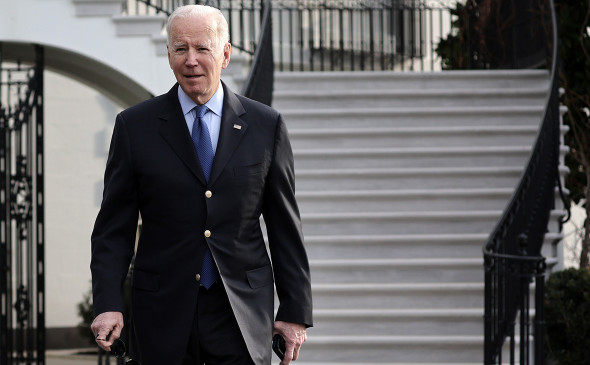U.S. President Biden said yesterday his weekend statement that Vladimir Putin "cannot remain in power" did not reflect new U.S. policy, but rather an expression of his "personal feelings" and "moral outrage" about Russia's atrocities in Ukraine.
Western media reports say Biden's off-the-cuff remark during a major speech in Poland on March 26 triggered global headlines and sent White House officials scrambling to clarify that the U.S. was not pursuing regime change in Russia.
A Kremlin spokesperson called the remarks "alarming," and some commentators suggested it played into pro-Putin propaganda and paranoia about U.S.-backed coups in Russia's neighborhood.
According to AXIOS, French President Emmanuel Macron said the ad-lib was unhelpful to peace talks and urged his fellow world leaders not to "escalate" either through "words or actions."
Biden reportedly told reporters he was "not walking anything back," before clarifying: "I was expressing my outrage. He shouldn't remain in power, just like bad people shouldn't continue to do bad things. But it doesn't mean we have a fundamental policy to do anything to take Putin down in any way."
"The last thing I want to do is engage in a land war or nuclear war with Russia. … I was expressing my outrage at the behavior of this man. It's more an aspiration — he shouldn't be in power. People like this shouldn't be ruling countries, but they do," he continued.
"Nobody believes I was talking about taking down Putin. Nobody believes that."
Biden went on to dismiss the notion that his rhetoric could cause Putin to escalate his aggression toward Ukraine or NATO, insisting that the Russian leader doesn't even listen to his own advisers.
U.S. News says Biden spent four days in Europe last week, strategizing with allies on how to address the Russian invasion of Ukraine, meeting with U.S. troops stationed in Poland as well as humanitarian group leaders and having an emotional, close-up visit with Ukrainian refugees. The visit was capped Saturday with a passionate and powerful address on the crisis, casting it as a historic battle between tyranny and democracy, praising Russian protesters and assuring Ukraine that "we stand with you.




